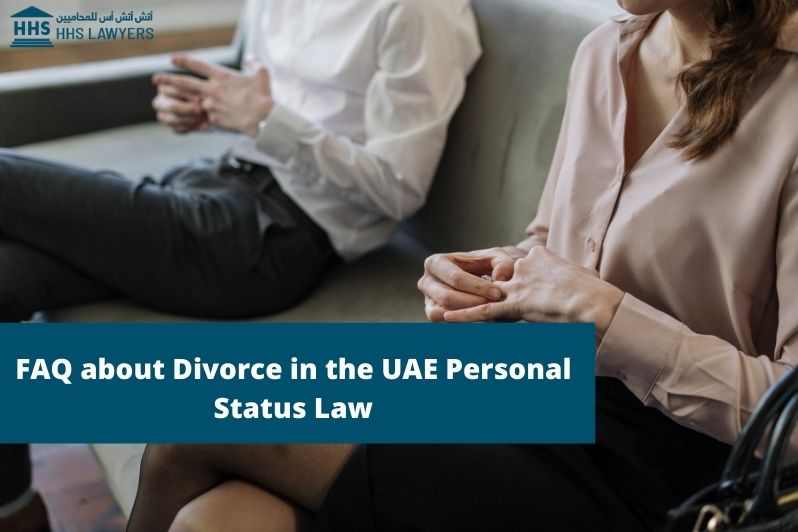Divorce has legal implications that require many procedures, in addition to other issues that are governed by Federal Law No. (28) of 2005 regarding personal status in the UAE (the Personal Status Law).
The Personal Status Law defines divorce as the dissolution of the legitimate marriage contract and indicated that a divorce is a legitimate act, whether it is verbally or in writing, or it is understood by a clear signal in the event of a disability.
Many people wish to understand the legal aspects of the issue of divorce, and we receive a number of questions about divorce on a regular basis, a number of which will be answered in this article.
What are the types of Divorce in the UAE?
Divorce is of two types: revocable and irrevocable, and irrevocable divorce is of two types, a major divorce and a minor divorce.
Revocable Divorce
According to the provisions of Article (104) of the Personal Status Law, revocable divorce is the divorce in terms of which the marriage contract does not end until the waiting period has expired, which means that the husband can still return his wife before the expiry of the waiting period.
This type of divorce does not terminate the marriage contract and the divorce is considered null if the man returns his wife again, whether by word or deed.
In the event that the waiting period ends, and the husband does not return his wife, the divorce has entered into the judgment of irrevocable divorce by Baynunah Sughair. It is noteworthy that revocable divorce is a case of being one divorce, but in the event of two valid divorces, the marital bond ends.
Irrevocable Divorce as a Minor Baynunah(minor divorce)
This type of divorce is as we mentioned when the husband makes the oath of divorce only once or twice, i.e. not the required 3 times and he did not return his wife during the waiting period.
The husband has the right to return his wife if he divorces her by means of a final divorce but only by means of a new contract and dowry, with her consent.
Irrevocable divorce is a Major Baynunah(major divorce)
This type of divorce is final and means that the two spouses must be separated. It is not permissible for the one who divorced his wife three times to return her, except after the expiry of the waiting period (Idda) from the other husband who had carnal knowledge of her pursuant to a valid marriage.
How to Choose the Best Divorce Lawyers or Attorney? Find Right Here!
What is Divorce by Harm?
The Personal Status Law enacted in the text of Article No. (117) that both spouses, in the event that the continuation of their marital partnership is not possible, have the right to request a divorce if there is definite harm caused to one of the parties. This is called a divorce of harm and is applied according to the laws of many countries.
In accordance with Article (16) of the Personal Status Law, the Family Orientation Committee shall endeavour to reconcile the two spouses and, in case of failure, the judge shall propose reconciliation to the spouses. If this reconciliation is not possible and the prejudice is established, the judge shall order divorce subject to certain conditions.
The judge can differentiate between spouses for harm if it is proven that the wife was severely beaten by the husband in front of just witnesses, or it is proven that the husband has abandoned his wife for more than six months, according to the testimony of witnesses, or if his absence from her lasts for more than a year, or he refuses to spend money on her.
This law was enacted to provide each party with the right to request a divorce in circumstances where it was impossible for them to remain married. However, in such cases, the court must verify that the harm that the applicant for divorce invokes has reached such a degree that it is no longer possible for him or her to continue with the marriage.
What is Consensual or Friendly Divorce?
The Personal Status Law in the UAE regarding divorce procedures first requires registration in the Family Guidance Department, which is a mandatory procedure for completing divorce procedures and allows spouses to express their concerns related to the marriage.
At this stage, a friendly or consensual divorce can be reached, and the spouses can reach a settlement based on the mutual understanding and sign it before the family counselor. Then, depending on if one or both parties filed for the divorce, they will appear before the court to conclude the divorce case amicably.
What is an Absentee Divorce?
Divorce in absentia is the divorce whereby a husband signed and pronounced, without the presence of his wife, an explicit statement of his intention to divorce her. Divorce in absentia may be necessary in circumstances where, for example, the spouses do not reside together in one place or are in different countries.
The Dubai Courts require the presence of two witnesses for an absentee divorce, or its revocation, to be valid and binding.
What are the Procedures for Divorce of Expatriates in the UAE?
The UAE Personal Status Law permits divorce for expatriates just as it permits them to marry.
Article 1 of the Personal Status Law stipulates that the provisions of the law, including those relating to divorce, shall apply to citizens of the United Arab Emirates as well as non-citizens, unless they insist on applying the laws of their home country.
However, if the law of the applicable country of the parties fails to adequately address all the aspects of their divorce procedure, the court shall revert to applying the law of the United Arab Emirates.
To inquire about this service
Email: sales@hhslawyers.com
WhatsApp (Messaging Only): +971 52 1782469 | WhatsApp & Phone: +971 52 1782364

